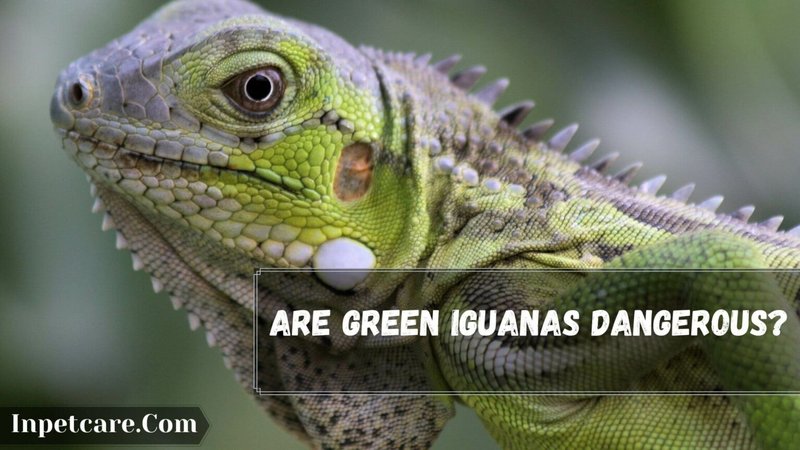
Iguanas are often seen as docile pets or intriguing wild animals, but they come with their surprises. You might be surprised to learn that they can, at times, pose some risk. Just like how a seemingly harmless dog can nip if provoked, iguanas can also show a more aggressive side if they feel threatened. So, whether you’re considering getting an iguana as a pet or just want to understand these creatures better, it’s essential to recognize both their charming and potentially dangerous traits.
Understanding Iguanas: The Basics
Iguanas are part of the Iguanidae family and come in several species, with the green iguana being the most commonly recognized. These reptiles can grow quite large, often reaching lengths of over five feet, making them appear more intimidating than they really are. They have strong bodies and long tails, which they use for balance and, in some instances, as a defense mechanism.
When it comes to their natural behavior, iguanas are primarily herbivores, munching on leaves, flowers, and fruits. Yet, they are known for their territorial nature, especially when it comes to males during mating season. You might wonder how this affects their interactions with humans. Well, an iguana feeling cornered or threatened can display aggressive behavior, such as puffing up, hissing, or even biting if it feels trapped.
How Iguanas Can Be Dangerous
While iguanas aren’t typically aggressive, there are several ways they could pose a risk to humans. Biting is the most obvious danger. An iguana’s bite can be surprisingly painful due to their sharp teeth, which are designed to shred vegetation. Though it’s rare for an iguana to bite without reason, it can happen if they feel threatened or are mishandled.
Another risk comes from their long, powerful tails. Iguanas can whip their tails with impressive force, potentially causing injury. Imagine getting whacked by a thick, swinging stick—definitely not a fun experience! This behavior is typically a warning sign, but it could easily catch someone off guard.
Finally, it’s worth noting that iguanas can carry salmonella, a bacteria that can make humans sick. If you’re handling an iguana or cleaning its habitat, washing your hands thoroughly afterward is a must. To put it simply, while iguanas aren’t likely to attack you unprovoked, knowing the potential dangers can help you stay safe.
Common Misconceptions About Iguanas
Many people have misconceptions about iguanas that can lead to unnecessary fear or misunderstanding. For instance, some folks believe that iguanas are naturally aggressive creatures. The truth is, iguanas, like many animals, respond to their environment and how they’re treated. If they’ve been handled gently and raised in a calm setting, they’re likely to be more relaxed.
Another common myth is that iguanas are low-maintenance pets. While they can be fascinating companions, they require specific care. Their habitats need to be well-kept, with proper temperature and humidity levels. Plus, they have unique diets that require attention. Misunderstanding their needs can lead to stress for both the iguana and its owner, which can potentially trigger defensive behaviors.
It’s crucial to do your research before adopting an iguana or spending time around one. Understand that they have their personalities, and like any creature, they need respect and space. You might be surprised by how enjoyable and non-threatening they can be once you know how to interact with them.
Safety Tips for Interacting with Iguanas
If you do find yourself around iguanas, here are some safety tips to ensure a positive experience:
- Respect Their Space: Always give iguanas room to move. Don’t crowd them, especially if they seem uneasy.
- Gentle Handling: If you need to handle an iguana, do so gently and carefully. Support their body well, especially their legs, to avoid causing stress.
- Watch for Warning Signs: If an iguana puffs up or hisses at you, it’s time to back off. These are clear signals that they feel threatened.
- Wash Your Hands: After handling an iguana or cleaning its area, always wash your hands to minimize the risk of germs.
Following these simple guidelines can help ensure that both you and the iguana have a safe experience together.
In the grand scheme of things, iguanas aren’t typically dangerous to humans, especially when treated with respect and understanding. They can be captivating pets or beautiful creatures to observe in the wild. However, like any animal, they have their limits and can react defensively if they feel threatened.
By learning about their behavior and taking the time to handle them properly, you can enjoy the company of these remarkable reptiles without concern. So next time you see an iguana, remember that it’s not just a colorful creature basking in the sun; it’s also a complex animal that deserves our understanding and care. Ultimately, whether you’re thinking of getting one or just curious about them, knowing the risks and rewards will help you appreciate iguanas even more.

